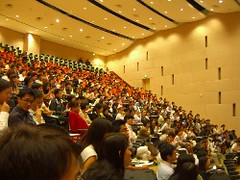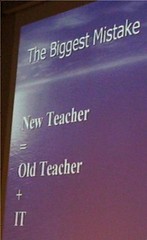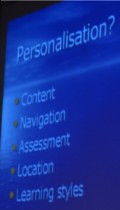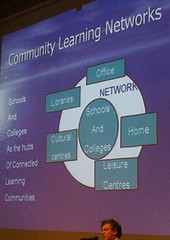

Dr. Chris Yapp (Head of Public Sector Innovation at Microsoft, UK) was the keynote speaker for Day-two.
Chris asked how many in the audience thought technology could transform the experience of education.
I thought almost everyone raised their hands.
Then came his punch line: "So when do you think this is going to happen?"
His point was the experience of education has not been transformed yet, in spite of all the IT investments in schools (he spoke as an authority about the UK public school system, but his talk easily applied to just about any country).
What has happened so far, he went on, was the application of technology to traditional educational. But it hardly transformed it in terms of experience for the child or young adult.
 "It's not about putting computers in classrooms or teaching teachers how to use IT. It's about changing the organisation."
"It's not about putting computers in classrooms or teaching teachers how to use IT. It's about changing the organisation."In his talk, he said there was no evidence that IT spending link to performance (and he quickly reminded the audience of where he worked).
It was the organsation culture, the utilisation of IT, and leadership that leads to performance.
"You cannot throw IT to a badly led sch and expect results."
He suggested a "re-engineering of the education infrastructure, curriculum and assessment, and teaching profession" to "put the learner in the heart of the system".
But he quickly added: Where will we find the time to do this? (which I thought earned him some credibility from the largely teacher-audience, whose reality was that they had very little discretionary time outside of the formal curriculum).
Chris thinks the solution is to automate as many of the "routine, low-grade" administrative tasks, so as to free more time for teachers "to think, plan, and network".
(I'll add that once routine work is removed, one mustn't slap on new stuff that ends up plonking the teacher back to square one).
Says if students leave schools thinking that learning stops, then educators and parents have failed.
He suggests that the future may belong to the small-sized countries like Scandinavia and Singapore. 'Small' tend to mean it was easier for the whole country to react and adapt to global trends.
Also, education needs to move from mass approach to personalised one. Granted that this would be very expensive but he believed that "people and persistence" would ultimately make this a reality.
To reinforce his point that the ability to do well in exams did not necessarily mean "doing well in life", he said Britain has more Nobel prize winners with third-class honours degree than First-class ones.







Education is the most conservative industry, according to Chris.
Near the end of his talk, he joked that surgeons and train drivers from 100 years ago would be stupified if they stepped into our hospitals and trains today. But a teacher from 100 years ago would walk into our classrooms and find that nothing has changed (same for libraries?)
It would take at least 30 years for any education system to be transformed, in his opinion.
He'd consider the education landscape to have been transformed if he saw:
- A culture of lifelong learning
- Access to lifelong learning
- Content to support the individual lifelong learner
- A social context for lifelong learning (a social process, not technological experience)
He asked why reading cannot be done in libraries, but have to be taught in schools (well, I like his idea but there are practical constraints -- like, Librarians aren't educators, and you'd need many libraries and librarians. Still it raises an interesting possibility that I might think about further).
Education should be:
- Lifelong (more of work)
- Lifewide (more than work)
- Lifedeep (about community & meaning)

By the end of his talk, I had this thought:
If we really want to transform the education system, perhaps schools need to rethink about their "customers".
I mean, shouldn't schools also teach parents, in addition to teaching their child.
If parents enroll their children in schools, there should be a way (or even compulsory) to have parents enroll themselves as part of the school.
Parents' failure to attend classes would literally mean failing their child.
I haven't thought about what the parent's curriculum should be (maybe someone might want to pick up this train of thought). But I thought perhaps such a system would ensure that Education is not something outsourced to schools or teachers, but something that involves the family.
[Next: Part 5]

Hmmm... interesting thought at the end of your post.
ReplyDeleteStill, I think there is a fundamental confusion here between "education" and "schools / schooling."
When will technology transform education - never or always. People learn. If you give them cell phones and computers, they probably learn in different ways, and about different things.
When will tech. transform schools? Probably never.
In our gov't sponsored adult basic education classes, computers were introduced to standardize the curriculum (make sure everyone had an "equal" education), and make data tracking easier for managers. Here, technology added to facilitators' sense of constriction and constant scrutiny (by accounts - literally).
Meanwhile, my classes - somewhat illicitly - are enriched by ideas and ambitions I pick up from rambling librarians (some, halfway around the globe!).
Of course librarians are educators. Thankfully, they're not school teachers, and the library is still a place kids and adults alike can go to learn without being judged, ranked or imposed upon.
Hey Wendell, I suppose it's semantics. Or most likely I didn't fully convey the context of the talk. In anycase, I thought the question (while loaded) was a nice way to make the audience think about how technology has been applied, as well as the definition of 'Teaching', 'Education' and 'Learning'.
ReplyDeleteYou know of more librarians who ramble, huh? LOL. You gotta let me know who they are, 'cos birds of a feather would love to flock together!